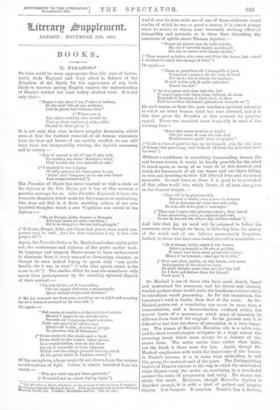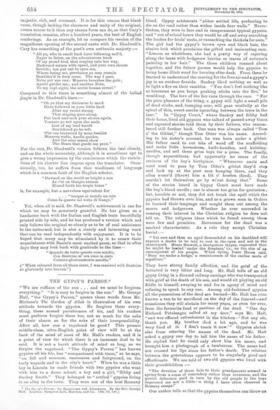BOOKS.
IL PARADISO.* No time could be more appropriate than this year of horror; which finds England and Italy allied in defence of the Kingdom of the Spirit, for the appearance of any book likely to increase among English readers the understanding of Dante's noblest but least widely studied work. It is not only that- "Degno 6 oho dove 1' altro s' Mums,.
Si oho coin' elli ad una militaro, Coal la gloria lore insiemo
(" Where one is The other worthily also should be, That as thorn warfare is alike, alike Should be their glory.") It is not only that even in those seraphic harmonies, which seem at first the furthest removed of all human utterances from the heat and horror of our earthly conflict, we can still hear, faint but inexpressibly stirring, the Spirit's unceasing call to victory :— " Ben in' acoore io eh' oil' era d'. alto lode Foreeche a me vermin. ' Risurgi e vinci' COrn! a eolui the non intends ed ode."
("I marked it was a hymn Of lofty praises. for there came to me,
(Arise' and Conquer,' as to one who hears
And comprehends non")
The Paradise. of Dante has never reached. so wide a circle as the Inferno or the Vita Nuova, yet it has at this moment a peculiar message for us. Like Paradise Regained, it lacks the romantic elements which make its forerunners so enthralling. One does not find in it those startling echoes of our own troubled thoughts which a sore Virgiliana can reveal in the Inferno "Ma se Dortgio, Lille, °mint° e Bruggio,
rotausor, tosto saris, vendetta ;
Ed io cheggia a lui oho tutto giuggia."
("If Douai, Bruges, Lille, and Ghent had power, then would ven- geance soon be sent._ And for that vengeance I cry to him who judges all,")
Again, the Paradise lacks, as Dr. Mackail and other critics point out, the exuberance and richness of the poet's earlier work. In language and imagery Dante seems to have -endeavoured to eliminate from it every sensual or distracting element, as though lie were - indeed trying to speak only "eon quella favella she Zi tuns in tubti " (" with that speech which is the same in all "): The similes which he uses are sometimes only saved from grotesqueness by the unfailing spiritual dignity of their context :—
" La anis lotizia mi ti tien.celato, Cho mi raggia diaterno, o min-anomie, Quasi annual di sua seta fasciato,"
("My joy conceals •me from you, swathing me in light and covering MO as u worm covered in its own silk.")
Or again :— " Dal centre al corchio o si dal cerohio al colitis) Movesi P acqua in un- ritondo vase; Second° elf Ii poreossa muesli edentro, Nona mid monte fe' subito ease Quosto oh' io dice, el come si taupe La gloriosa vita di TOmmase."
(rProm centre to the circle and no bank Thom circle to the centre, water moves
Ina round elsaliee, even as the blow Impels it inwardly or from without;
Which was the image glanced into my mind
As the great spirit of Aquinas ceased,") Of his metaphors, a large majority are drawn from the various manifestations of light. Colour is almost banished from his world :— "Non per color ma perlume parvente."
("Revealed not by colour but by light.")
rho Paradisa of Dante AtioPoiori ; an Pa' oorimoni in ',Rona Vow TvaTharition. Il Chnries Lancelot SkadwanD.O.L, With an introduction by John )4111= 2Li.oksH, LL.D., ,to. Lonsloa: Macmillan and Co. Lies. Gd. net.]
And if ever he does make use of one of those elaborate visual similes of which he was so great a master, it is almost always. when he wishes to obtain some unusually striking effect of tranquillity and quietude, as its these lines describing timer concourse of spirits about Thomas Aquinae "Donne mi parver non da hallo sciolte, Ma elm arrestin taoite, aseeltande Pin Ghe to nuovo note hanne
("They seemed as ladies who cease not from the dance, but stand a moment to catch the change of tune.").
Or again:—
" Come in pesehiera eh' 3 tramptilla o purer Traggonsi i posci io cib cho vien di fuori Per modo cho le shisnin for pasture; Si vid' io ben prtl di mills splendori PUMsi vas noi."
("As in a quiet and dear lake the- fish
If aught approach thorn from without, do draw. Towards it deeming it their food, so drew
Pull more than thousand splendours towards its.")
By such means as these the poet reaches a spiritual intensity to which no other human mind has ever attained, and it ie this that gives the Paradise at this moment its peculiar appeal. Never was mankind more tragically in need of the warning that-
" Ben b elle senza terming si doglia Chi per arum. di (lose cite non dud.
Eternahnento amor si spoglia."
("Endless store of grief he lays up for himself, who for the love of things that pass away, cuts himself off from the love that lasts for ever.")
Without a confidence in something transcending human life and human sorrow, it would be hardly possible for the mind to stand apart, as many of us must do at this moment, an& watch the framework of all our hopes and our ideals falling in ruin and involving in their fall beloved lives and cherished memories. In such times as these it is good to be remiuded of that other world into which Dante, of all men, has given us the clearest insight :—
" Cosi vid' io la gloriosa rota
Moversi e render voce a von its tempra Ed in doleezza oh' assiss non pub notes Se non coil dove gioir s' insempra."
(" Thus saw I. move time glorious- wheel ; thus heard. Voice answering voice, so musical and soft, It can be known but where day endless shines.") And into that. joy we need not be ashamed to follow his :summone, even though we leave, in following him, the misery of the world and of our fellows momentarily forgotten,. Indeed, to those who have once tasted, the call is irresistible m-
" Or ti rimers letter, soprail too bunco, Dietro ponsaudo a 66 cho si preliba,
S' ostler vuoi lieto nasal prima elm staneo. Mosso ho innanzi.; mum per to ti cibas"
("Now rest thee, reader, on thy bench, and mass Anticipative of the feast to come. So shall delight make thee not feel thy toil, Lo I have sot before thee, for thyself Feed now.")
Dr. Maekail is one of those who have most clearly heard and understood the summons, and his serene and choicely worded preface alone would make the handsome volume which he introduces worth possessing. As for the translation, the translator's work is harder than that of the critic. As. Dr. Meehan points out, a translation can never be more than a transvaluation, and a transvaluation confined within the. narrow limits of a convention which must of necessity be different from that of the original. In the present case it is difficult to feel that the choice of convention is a very happy one. The stanza of Illarvelrs Horatian ode is a noble one, and its short second couplet mitigates to a large extent the recurring break which must always be a feature of the stanza. form. The metre marks time rather than halts, but the break is there none the less. Again, though Dr. Mackail emphasizes with truth the importance of the terzina in Daute's scheme, it is in some ways misleading, to call this group the metrical unit of the poem. The distinguishing feature of Dante's scheme is the way in which the interlocked triple rhymes carry the metre on, combining in a wonderful manner the sense of progression and unity. No stanza east attain this merit. Moreover, though Marvell's rhythm is dignified enough, it is with a kind of gallant and singing dignity. It is buoyant. It marches. Dante's line is flowing, majestic, rich, and resonant. It is for this reason that blank verse, though lacking the closeness and unity of the original, comes nearer to it than any stanza form can do, so that Cary's translation remains, after a hundred years, the best of English renderings. As an example, let us compare his version of the magnificent opening of the second canto with Dr. Shadwell's. Cary has something of the poet's own authentic majesty :—
" All ye, who in small bark have following sail'd, Eager to listen, on the adventurous track Of my proud keel, that singing cuts her way, Backward return with speed, and your own shores Revisit; nor put out to open sea,
Where losing me, perchance ye may remain Bowilder'd in deep maze. The way I pass, No'er yet was run: Minerva breathes the gale; Apollo guides me; and another Nine, To my rapt sight, the arctic beams reveal."
Compared to this there is something almost of the ballad jingle in Dr. Shadwell's lines :— " Oh ye that my discourse to mark Have followed in your little bark After my vessel strong That singing goes along, Put back and seek your shores again.
Venture ye not upon the main Lest of my lead bereft Bewildered ye be left. O'er sea traversed by none besides Minerva wafts, Apollo guides, And the nine muses show
The Bears that guide my prow."
For the rest, Dr. Shadwell's version follows the text closely, and on the whole accurately, although it is sometimes apt to give a wrong impression by the conciseness which the restric- tions of his shorter lino impose upon the translator. Occa- sionally, too, he suffers from that woolliness of language which is a common fault of the English scholar.
"Dawned on the world as bright a sun As e'er on Ganges stream Blazed forth his tropic beam" is, for example, but a nerveless equivalent for . . . "renegue al mondo tin sole Como fa, guests: tal volta di Gauge."
Yet, when all is said, Dr. Shadwell's achievement is one for which we may be genuinely grateful. He has given us a handsome book with the Italian and English texts beautifully printed side by side, and he has produced a version which not only follows the original so closely as to be of real assistance to the unlearned, but is also a stately and interesting work that can be read independently with enjoyment. It is to be hoped that many may be stimulated by it to renew their acquaintance with Dante's most exalted poem, so that in after days they may look back with gratitude to the time.
" Quando da tutte questa cose sciolto, Con Beatrice m era 811130 in deli) Cotanto gloriosamente accolto."
(" When released from all these cares, I was received with Beatrice so gloriously into heaven.")















































 Previous page
Previous page